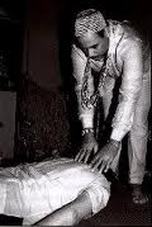 Are you always starting fires?
Are you always starting fires? (11-3) The flame of disagreement doesn't care who ignited it. La llama de la discordia no respeta la mano que la prendió.
Ojuani (11) is an odu that talks about a lack of gratitude. Combined with Ogundá (3), it indicates a conflictive personality. Some people have the idea that the world owes them something, and the favors that are done for them are simply their due. Time after time, they accept favors without saying thank you, or even acknowledging that another person went out of their way to help them. Good fortune comes along and act like it's the natural order of things. They can't imagine bad luck, or a person who doesn't want to help them, because they think the world revolves around them, and they deserve to have the best of everything. This kind of person is bound to experience conflict with other people sooner or later, because no one can keep taking and taking without giving something back. Misunderstandings arise about what someone owes someone else, what ought to have been done and wasn't, what is fair or unfair, what the obligations of one person are to another. This proverb warns about the dangers of creating discord in your life, because even when your complaints and criticisms are aimed at another person, they will always reflect back on you. Every time you make an unreasonable demand or use words to hurt another person, you're lighting the flame of discord in your life. Discord spreads like a wildfire, and eventually destroys everything in its path.
There's really no such thing as a one-sided argument. Once the demand, complaint, criticism, insult, or accusation is out of your mouth and hurled at another person, the other person has to react in some way. Even if the other person walks away and refuses to engage in an argument, a conflict now exists where there wasn't one before. Tensions remain, the relationship is damaged. Occasional flare ups are normal, but this proverb asks you to reflect on how often you go through life stirring up discord? When you perceive that someone is letting you down, or not meeting the demands you've created, do you lash out? When someone does something to help you, do you show genuine gratitude? Do you take too much for granted? Not showing gratitude eventually causes other people to feel used and abused. Failure to acknowledge what they've done for you is another way to create discord in your life, because it sets up a dynamic that leads to unfulfilled expectations, resentment, and anger. Silence when a kind word is needed can be just as bad as an insult spoken aloud.
Do you find yourself in situations where everyone is mad at you and you don't know why? Is your hand is the one setting fire to the situation, perhaps unintentionally, but still with negative consequences for you? Sometimes more than a cursory thank you is needed. Genuine gratitude requires you to see that you aren't owed any special favors, and when good things come your way, they come through acts of kindness and mercy that could have, under other circumstances, been withheld. Reflect on all you have and recognize that it could all be taken away. Nothing in life is guaranteed. Feel gratitude for what you've been given, and respond to the world around you with a little more humility. Stop saying "I want" and "I deserve," and think more about what you have that you can give back to others.
Ojuani (11) is an odu that talks about a lack of gratitude. Combined with Ogundá (3), it indicates a conflictive personality. Some people have the idea that the world owes them something, and the favors that are done for them are simply their due. Time after time, they accept favors without saying thank you, or even acknowledging that another person went out of their way to help them. Good fortune comes along and act like it's the natural order of things. They can't imagine bad luck, or a person who doesn't want to help them, because they think the world revolves around them, and they deserve to have the best of everything. This kind of person is bound to experience conflict with other people sooner or later, because no one can keep taking and taking without giving something back. Misunderstandings arise about what someone owes someone else, what ought to have been done and wasn't, what is fair or unfair, what the obligations of one person are to another. This proverb warns about the dangers of creating discord in your life, because even when your complaints and criticisms are aimed at another person, they will always reflect back on you. Every time you make an unreasonable demand or use words to hurt another person, you're lighting the flame of discord in your life. Discord spreads like a wildfire, and eventually destroys everything in its path.
There's really no such thing as a one-sided argument. Once the demand, complaint, criticism, insult, or accusation is out of your mouth and hurled at another person, the other person has to react in some way. Even if the other person walks away and refuses to engage in an argument, a conflict now exists where there wasn't one before. Tensions remain, the relationship is damaged. Occasional flare ups are normal, but this proverb asks you to reflect on how often you go through life stirring up discord? When you perceive that someone is letting you down, or not meeting the demands you've created, do you lash out? When someone does something to help you, do you show genuine gratitude? Do you take too much for granted? Not showing gratitude eventually causes other people to feel used and abused. Failure to acknowledge what they've done for you is another way to create discord in your life, because it sets up a dynamic that leads to unfulfilled expectations, resentment, and anger. Silence when a kind word is needed can be just as bad as an insult spoken aloud.
Do you find yourself in situations where everyone is mad at you and you don't know why? Is your hand is the one setting fire to the situation, perhaps unintentionally, but still with negative consequences for you? Sometimes more than a cursory thank you is needed. Genuine gratitude requires you to see that you aren't owed any special favors, and when good things come your way, they come through acts of kindness and mercy that could have, under other circumstances, been withheld. Reflect on all you have and recognize that it could all be taken away. Nothing in life is guaranteed. Feel gratitude for what you've been given, and respond to the world around you with a little more humility. Stop saying "I want" and "I deserve," and think more about what you have that you can give back to others.


 RSS Feed
RSS Feed
